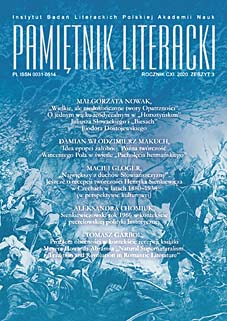„Największy z duchów Słowiańszczyzny”
“The Greatest of Slavonic Spirits”
More on Henryk Sienkiewicz’s Output Reception in 1880–1938 Bohemia (in Cultural Perspective)
Author(s): Maciej GlogerSubject(s): Studies of Literature
Published by: Instytut Badań Literackich Polskiej Akademii Nauk
Keywords: Henryk Sienkiewicz; Polish-Russian cultural relations; Slavophilism; Slavic reciprocity; modern national identity; nationalism
Summary/Abstract: The article presents the reception of Henryk Sienkiewicz’s output and that of his social-political activity in Bohemia in the years 1880–1938. At that time, Sienkiewicz along with Leo Tolstoy was most widely-read and respected European writer. Approaches to the problem to this day have neglected its political-cultural aspect, due to which the specificity and non-literary mode of functioning Sienkiewicz’s presence in Czech culture remained unnoticed. The aforementioned reception has thus failed to give tangible results in their artistic and literary-critical dimension, while in social and national dimension Sienkiewicz played a considerably prompting role, adding to the shaping and strengthening of modern Czech national identity. The Czech nationalism had, primarily, philological and literary-scientific basis, and was followed by political one. Hence the significance of Slavonic literary and cultural, especially Russian and Polish, inspirations in the shaping of Czech identity. The process is visible in translations as well as in articles connected with the Polish author’s output and activity published in the most important Czech daily of that time “Národní listy” (“The National Newspaper”) (issued 1861–1941), and in dozens of other Czech press titles, both local and national, following the path of “The National Newspaper.” Sienkiewicz’s creativity was regarded as a great moral support in the fight with Germanisation and, often in a biased way, paying no attention to Polish-Russian conflict (partition of Poland, Russification) was linked with Slavophilic ideals and concepts of Slavic reciprocity with utopian overtone which in the Czech policy played the key role even until the year 1948. Sienkiewicz was labelled as a Slav and more often treated as a representative of the entire Slavdom than as a writer from a country oppressed by Russia.
Journal: Pamiętnik Literacki. Czasopismo kwartalne poświęcone historii i krytyce literatury polskiej
- Issue Year: 111/2020
- Issue No: 3
- Page Range: 39-58
- Page Count: 20
- Language: Polish

